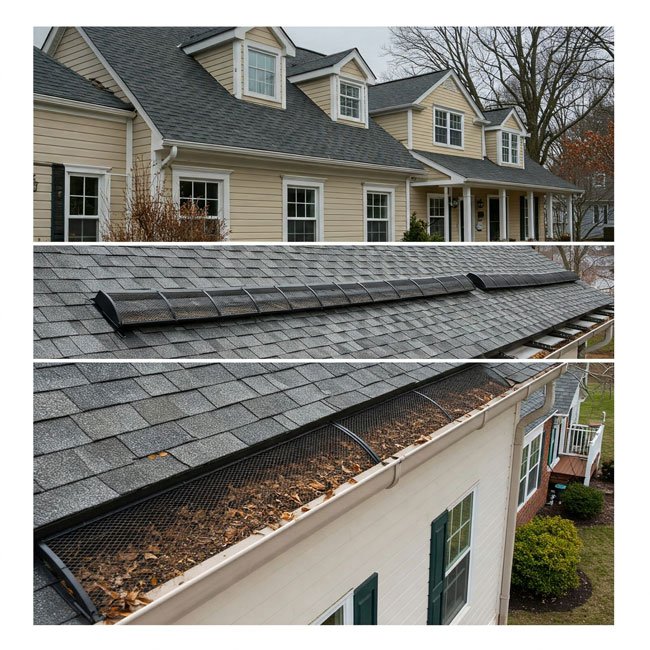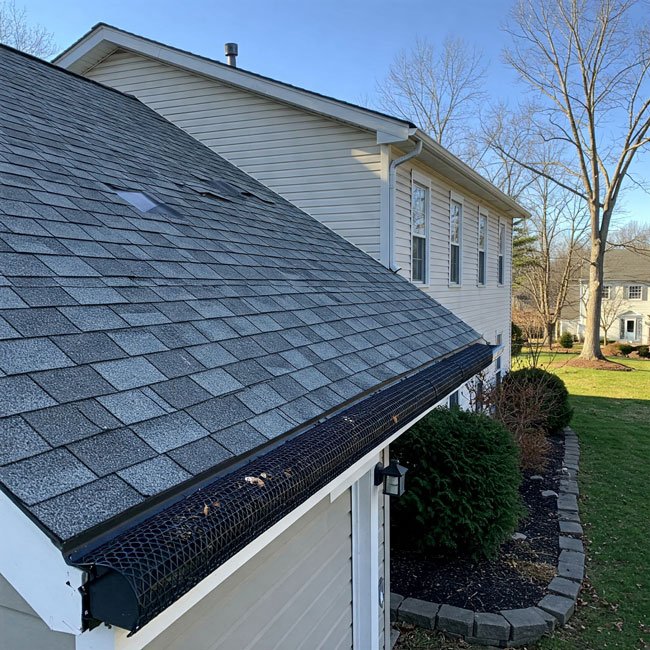
When it comes to protecting your home from water damage, gutter guards play a crucial role. As homeowners become more proactive about gutter maintenance, the debate heats up in 2025: Brush vs. Mesh vs. Reverse Curve gutter guards—Which one is truly the best? If you’re searching for “best gutter guards 2025,” “gutter guard comparison,” or “types of gutter guards explained,” this comprehensive guide will help you choose the right fit for your home.
What Are Gutter Guards and Why Do You Need Them?
Gutter guards are protective coverings or systems installed over gutters to prevent leaves, twigs, debris, and pests from clogging your gutters. The primary goal is to ensure proper rainwater drainage, reduce gutter cleaning frequency, and prevent foundation damage, roof leaks, and ice dams.
Top Benefits of Installing Gutter Guards:
- Reduce maintenance
- Prevent water overflow
- Extend gutter lifespan
- Improve home drainage
- Deter pests and nesting
Brush Gutter Guards: Affordable, but Are They Effective?
✅ What Are Brush Gutter Guards?
Brush gutter guards resemble large pipe cleaners. They sit inside the gutter and catch debris while allowing water to flow through the bristles.
⭐ Pros of Brush Gutter Guards:
- Easy to install (DIY-friendly)
- Cost-effective upfront
- No need to modify existing gutters
❌ Cons of Brush Gutter Guards:
- Tend to clog easily with fine debris
- Require frequent cleaning
- Limited durability over time
📊 Best For:
Budget-conscious homeowners looking for a quick fix.

Mesh Gutter Guards: A Balanced, Popular Option
✅ What Are Mesh Gutter Guards?
Mesh gutter guards use a fine metal or plastic screen to block debris while letting rainwater pass through.
⭐ Pros of Mesh Gutter Guards:
- Excellent debris filtration
- Durable (especially stainless steel options)
- Work well in heavy rain
❌ Cons of Mesh Gutter Guards:
- Professional installation recommended
- Can clog with fine shingle grit over time
- Premium options can be costly
📊 Best For:
Homeowners in leafy areas needing superior filtering.
Reverse Curve Gutter Guards: Engineered for Maximum Water Flow
✅ What Are Reverse Curve Gutter Guards?
These have a curved design that uses surface tension to direct rainwater into the gutter while debris falls off the edge.
⭐ Pros of Reverse Curve Gutter Guards:
- Long-lasting and low maintenance
- Effective in heavy rainfall and snow
- Professionally installed with warranties
❌ Cons of Reverse Curve Gutter Guards:
- Higher upfront cost
- May not blend well aesthetically with all rooflines
- Can lift shingles if not installed correctly
Best For:
Homeowners seeking permanent, high-efficiency solutions.
Trending Search Keywords:
reverse curve gutter system, leaf filter vs reverse curve, best permanent gutter guard system
Comparison Table: Brush vs. Mesh vs. Reverse Curve
| Feature | Brush Guards | Mesh Guards | Reverse Curve Guards |
|---|---|---|---|
| Cost | Low | Moderate | High |
| Installation | DIY | DIY/Pro | Professional Only |
| Debris Blocking Efficiency | Moderate | High | High |
| Maintenance | Frequent Cleaning | Occasional Cleaning | Minimal |
| Durability | Moderate | High (metal mesh) | Very High |
| Best For | Budget DIYers | Average homeowners | Long-term protection |
🏡 Which Gutter Guard Is Best for Your Home in 2025?
✅ Choose Brush Guards if:
- You need an inexpensive, easy-to-install temporary solution.
- You’re okay with regular gutter cleaning.
- You don’t get a lot of small debris or pine needles.
✅ Choose Mesh Guards if:
- You want a balance of price and performance.
- You live near lots of trees or experience heavy rain.
- You prefer less frequent maintenance.
✅ Choose Reverse Curve Guards if:
- You’re investing in a long-term, professional system.
- You want minimal maintenance.
- You experience extreme weather or large roof areas.
🛠️ DIY vs. Professional Gutter Guard InstallationDIY:
- Cheaper upfront
- Best for brush and some mesh guards
- Risk of improper fit or voiding warranties
Professional:
- Required for reverse curve and premium mesh systems
- Ensures proper fit, sealing, and slope
- Comes with warranties and long-term reliability
Trending Search Keywords:
gutter guard installation companies, best gutter guard installers near me, how to install gutter guards
💰 Cost Breakdown in 2025
| Type of Guard | Average Cost per Linear Foot | Installation Type |
|---|---|---|
| Brush | $2 – $4 | DIY |
| Mesh (Plastic/Metal) | $3 – $8 | DIY/Pro |
| Reverse Curve | $8 – $15 | Professional Only |
❓ Frequently Asked Questions
Q: Do gutter guards work in heavy rain?
A: Yes—especially mesh and reverse curve systems. Always choose models rated for your climate.
Q: Can gutter guards prevent ice dams?
A: Not entirely, but they reduce debris that contributes to dam formation.
Q: How long do gutter guards last?
A: Brush (3–5 years), mesh (10–20 years), reverse curve (20+ years with proper care).

Choose the Best Gutter Guard for Long-Term Value
When comparing Brush vs. Mesh vs. Reverse Curve Gutter Guards, it all comes down to your budget, local weather conditions, roof style, and willingness to maintain the system. In 2025, mesh and reverse curve systems dominate the market due to their durability and effectiveness—making them the best gutter guard systems for long-term homeowners.
🟢 Need Gutter Guard Installation in Massachusetts?
Contact your local gutter guard professionals for a free quote and gutter inspection today. Don’t wait until clogs cause water damage—protect your home with the best gutter guards in 2025.
